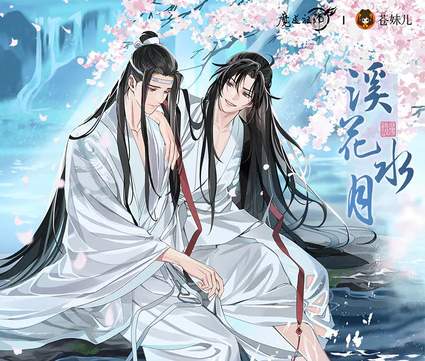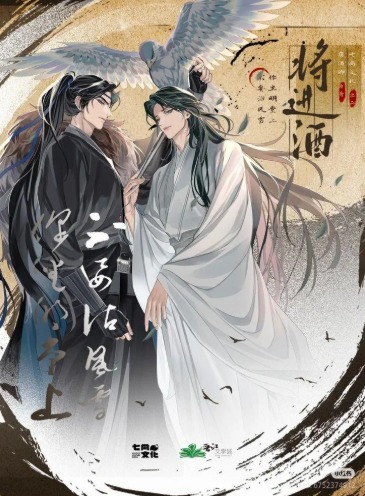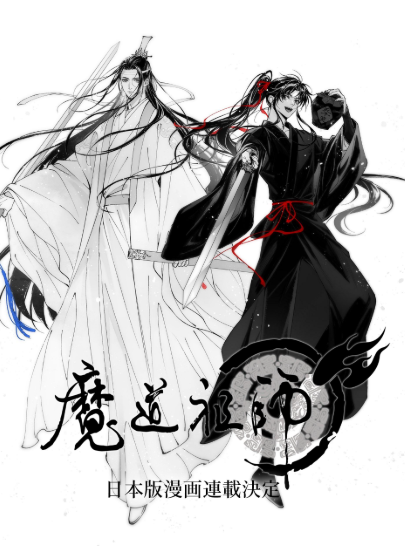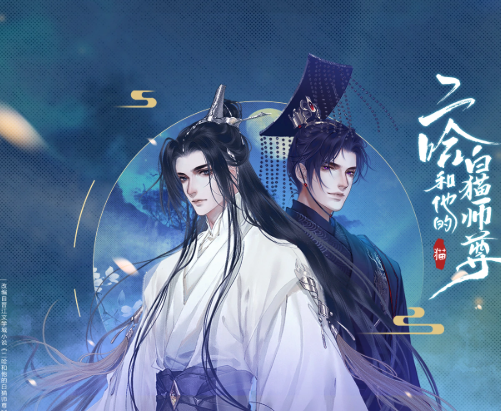The Untamed and the Danmei Scene
Before gaining international attention on Netflix, the Chinese drama The Untamed began much more quietly as a webnovel titled Mo Dao Zu Shi. It was published online by the author under the pseudonym Mo Xiang Tong Xiu, one of the most influential writers in the danmei scene, a Chinese literary genre focused on romantic stories between male characters and popular among female readers. Danmei itself draws influence from the Japanese genre known as Boys' Love or BL.

The original novel Mo Dao Zu Shi was considered bold within the Chinese context. It was emotionally rich, explicitly romantic and centered on the relationship between two young men, Wei Wuxian and Lan Wangji. Published chapter by chapter on the JJWXC platform, the work quickly attracted thousands of fans, and the strength of this organic readership eventually caught the attention of Tencent, a major entertainment company in China.
The television adaptation premiered in 2019 with significant investment in elaborate costumes, striking choreography and a dramatic atmosphere that reflected the tone of the novel. Actors Xiao Zhan and Wang Yibo showed strong chemistry on screen, even though it had to remain restrained due to censorship. The series immediately became a hit in China, reaching huge viewership numbers and turning its leads into major media sensations.

Not long after, the series expanded globally when Netflix acquired the rights and made The Untamed available to viewers around the world. This marked a turning point for danmei in the West. Millions of people discovered a Chinese drama inspired by a BL romance, even if softened for television, and became fascinated by the emotional world built from MXTX's story.
The impact was so significant that the novel, once limited to niche readership, became an international reference.
However, despite its success, The Untamed is not a completely faithful adaptation. The most important change lies at the heart of the story, the relationship between the protagonists. In the novel, Wei Wuxian and Lan Wangji are explicitly a couple, with declarations of love, moments of intimacy and a recognized bond. The series instead transforms this relationship into a form of deep friendship expressed through looks, gestures and symbolism but without any direct expression of affection. This was not an artistic decision but a requirement imposed by Chinese censorship.
Other differences appear in the general tone of the narrative. While the novel is darker, the series softens violent scenes, reduces tragic elements and reorganizes events to make them more acceptable. Secondary characters had their arcs shortened or altered and certain revelations considered too explicit were replaced with different narrative choices.

Even so, The Untamed maintains the essence of the original work. It preserves the unbreakable bond between two men who recognize, complement and change each other. The strength of this connection, spoken or unspoken, is what won audiences over and turned the series into a cultural landmark.
It is symbolic that a story born from a genre targeted by censorship in China found its freedom through international audiences.

The History of Danmei
Before examining how the genre behind the series has faced intense persecution in its country of origin, it is important to understand a bit of its background.
Danmei in China existed long before the word danmei was used. Its roots lie in China's long tradition of stories about deep bonds between men, tales that portrayed loyalty, devotion and intense emotional connection. These narratives were not explicitly romantic but they allowed room for interpretation.
Danmei as it is known today only took shape at the end of the twentieth century, driven mainly by the internet and exposure to external influences such as Japanese Boys' Love.

In the 1990s, during a period of economic opening and increased cultural exchange, young Chinese women began reading BL works from Japan, especially manga and anime that depicted idealized and androgynous male romance. During this time, the term danmei began to be used in China to describe these narratives. Although the genre was initially imported, it was quickly adapted to local tastes and cultural sensibilities. As internet access spread, online forums and communities multiplied and readers became writers. Danmei evolved from foreign content to a uniquely Chinese form of storytelling.
A major milestone in this evolution was the rise of webnovel platforms, especially JJWXC. For the first time, everyday women including students, housewives, teachers and young writers working in secret could publish serialized romances for thousands of readers.
Danmei grew with unexpected force. Writers created stories that combined xianxia fantasy a genre focused on cultivation, immortals and supernatural powers heavily inspired by Chinese mythology, Taoism, Buddhism and martial arts with clan politics, reincarnation, war and at the center of it all the bond between two male protagonists.
This movement created more than a literary genre. It created an entire ecosystem that included fandoms, fanart, translations, reading communities, creative economies and small conventions.

Academic researchers note that danmei emerged as a symbolic space where women writers could explore emotional dynamics, questions of identity, power structures and emotional freedom in ways that traditional fiction rarely allowed.
Publishers like Seven Seas Entertainment, now one of the biggest names bringing danmei to Western readers, function as emotional laboratories that showcase idealized, tragic or spiritual romances where the bond between protagonists is not only romantic but also moral, epic and often metaphysical. This makes the genre a natural home for exploring deep emotional experiences.
Among all the works that shaped the global reach of danmei, none had as much impact as Mo Dao Zu Shi between 2015 and 2016. Originally serialized on JJWXC, the novel became a sensation. The emotional complexity between Wei Wuxian and Lan Wangji, built through years of grief and redemption and expressed with quiet intensity, turned the story into a landmark of Chinese digital literature. Its success extended beyond the internet with an award winning animated adaptation, a live action drama and a massive expansion of fandoms, translations, fanart and academic studies.
Today, universities, cultural journals and specialized media often highlight Mo Dao Zu Shi as the primary gateway for global audiences discovering modern danmei. The novel stands out because it blends complex narrative, mystical aesthetics and a romance told through layers of symbolism.

Danmei production is not an isolated phenomenon. It represents the creative expression of women writers, large digital platforms, highly engaged fans and a culture that continues to produce meaningful narratives despite political restrictions. For readers and writers around the world, danmei has become not only a genre but a space of imaginative freedom. As works like Mo Dao Zu Shi show, it is a fertile ground where romance thrives in both written and adapted forms.
The overwhelming success of The Untamed introduced danmei to global audiences and suddenly the genre, once on the margins of pop culture, became one of the major cultural exports of contemporary Chinese fiction. Fans around the world discovered xianxia storytelling but just as danmei gained visibility it also began to face serious challenges.

As more conservative policies took hold in China, the government began viewing danmei as a threat to public morality. Censorship increased, adaptations were increasingly softened and writers began to be monitored. What had once been seen simply as romance turned into a political issue.
Today, danmei exists in two very different worlds. It is repressed in its homeland but celebrated internationally. It is a genre created by the artistic drive of women and it continues to exist because imagination and human connection do not surrender easily to censorship.
Literature Under Siege
In recent years, China has intensified its crackdown on danmei authors. What was once a digital phenomenon tolerated with a degree of ambiguity has become a direct target of the state, involving arrests, platform censorship, and digital surveillance. Reports from outlets such as Associated Press (AP News), Le Monde, and TheM.us make the situation clear: writing danmei has become genuinely dangerous.
The shift in tone became evident around 2020 but gained real momentum after 2021, when the government issued guidelines aimed at “rectifying” content considered harmful to official values. These guidelines classified danmei novels and fanfics as “abnormal aesthetics.” According to Le Monde, police investigations began focusing directly on young women who published danmei online, many of them completely outside the traditional publishing market and writing only for small digital communities.
One of the most emblematic cases is that of the writer known by the pseudonym Tianyi, who was sentenced to 10 years in prison after publishing a novel deemed “profitably obscene.” The severity of the sentence drew global attention and was widely reported by AP News and TheM.us, which noted that writers of heterosexual heavy fiction rarely face such harsh punishment.
The unequal application of the law shows that the target is not merely heavy content, but homo content, especially when created by women.

Another investigation indicates that police have begun using tracking algorithms to identify danmei writers, pursuing even those who sell homemade PDFs, hand-printed fanfics, or charge small amounts for extra chapters. College students, housewives, and even teenagers have been interrogated, and some had their computers seized. Many told the French newspaper that officers described their writing as “moral corruption” and “harmful propaganda.” There are even rewards offered for reporting “pornographic material” to the police.
According to AP News, the repression is also tied to state concerns about the power of fandoms, highly active and economically significant communities of women who support danmei. The global success of adaptations like The Untamed and the vast underground market of fanfics and derivative products only intensified surveillance.
Beyond arrests, there is a broader campaign of cultural erasure. Online reading platforms have been forced to remove entire danmei categories, author accounts have been suspended or deleted without warning, audiovisual adaptations have removed explicit romantic language, and thousands of works disappeared from the internet overnight.
For many writers, publishing online has become an exercise in self-censorship in which every word risks being interpreted as forbidden.

This phenomenon is part of a larger strategy to align culture with a moral ideal, restrict spaces for female expression, and control narratives that stray from the official model. This persecution disproportionately affects women because they make up the majority of danmei authors and symbolically challenge a space dominated by male-centered narratives about men.
The wave of repression is therefore not merely a literary attack. It is an attack on women’s creative autonomy, on the diversity of emotional expression, and on imagination that refuses to be controlled. Danmei, which for years existed as an emotional refuge and collective creation, has become a battlefield where fiction and politics intertwine.
In the end, the issue goes beyond literature. It is about understanding how authorities react when millions of women create and share narratives that challenge what those authorities consider ideal, redefine masculinity, and build communities of their own. The persecution of danmei authors reflects the fear of women’s imagination when it grows, organizes, and becomes too vast to contain.

In the Shadows
As repression against danmei escalates, Chinese authors now live in a form of “literary underground.” What was once a thriving presence on webnovel platforms has become a minefield. Even so, these writers have not disappeared; they have adapted. The current landscape is one of creativity under pressure, yet unwavering.
The first reaction observed by international journalists is self-policing. Authors have begun writing stories that, at first glance, appear to focus on “deep friendship” or “spiritual brotherhood.” The romantic subtext remains but is hidden beneath symbolic layers, something like “writing love where no one can claim love exists.” It is a gray zone.
Many writers have also adopted what Le Monde calls narrative fragmentation. Full stories are no longer published on major platforms. Instead, they appear in broken pieces, shared privately with limited groups of readers. There is no longer a complete “book” online, only scattered fragments.

Another tactic is the use of metaphors. Instead of writing directly about love, authors use alternative terms. Instead of a kiss, they refer to an “exchange.” Repression creates new forms of language, and women’s creativity relies on these gaps to continue existing.
There is also growing migration to smaller platforms, lesser-known sites, or closed communities. Writers have drastically reduced their presence on major websites and moved to small private forums, limited servers, and invitation-only newsletters that require manual approval. While none of this ensures complete safety, it adds layers of protection.
A curious development is that some authors have begun sending highly condensed versions of their stories, almost like expanded synopses, to translators or fans living outside China. This means a work no longer exists solely within the country, making it harder to erase completely. These are not formal or complete editions but fragments traveling abroad to survive.

Another strategy is thematic displacement. The author writes a “danmei that is not danmei,” featuring warriors, cultivators, princes, generals, all men, all with dual dynamics, but without any explicit romantic expression. The subtext is still there, but the text does not acknowledge it. It is a tiny distance between what can be written and what is meant.
Many of these works still resonate with fans: those who know will understand; those who do not will simply read past it.
Finally, there are reader communities. Reports show that fan groups create support networks, save files before deletion, preserve fanfics, create backups, and keep alive the memory of banned works. In many cases, the fandom has become an archive, a museum, and a refuge, an invisible library where women continue to share their imagined worlds despite the risks.
In the end, danmei does not disappear because it is, above all, an emotional language created by women, and languages survive even when attempts are made to silence them. Censorship becomes harsher, and authors become more subtle and inventive.

The Future of Danmei
The current persecution of danmei authors in China is not only an attack on the present state of the genre. It also signals what the genre may or may not become in the future. Literature born from women’s boldness and imagination now exists between two extremes: internal suffocation and international expansion. On one side, creative freedoms are being restricted; on the other, the world welcomes these stories with curiosity and admiration. The result is a divided and unpredictable future.
Inside China, researchers suggest that danmei will move further underground. The genre will not disappear because it is too large, too emotional, and too culturally rooted, but its form will change.
We will likely see more coded, symbolic, and less explicit stories. Relationships will shift from direct narratives to metaphors, allegories, and subtext. Danmei may evolve into a genre of “secret love” written between the lines, full of codes that only community members understand. Authors’ creativity tends to increase in proportion to censorship, not because it is interesting but because it is necessary.

Another likely shift is forced de-professionalization. Platforms that once paid authors well are now heavily monitored. Many writers have already moved to small forums, private groups, and limited-distribution channels. This will make danmei less centralized and less profitable within China. Paradoxically, it may also make the genre more artisanal, intimate, and community-driven. Smaller stories shared with specific readers may strengthen bonds and preserve the genre’s original value as a space for women’s emotional freedom.
However, there is a serious risk. Repression may create a generation of authors who are genuinely afraid to write. This cultural trauma may reduce innovation, limit bold themes, and stall danmei’s aesthetic development. Younger writers may grow up believing that the genre is too dangerous, which represents the greatest threat: not the end of danmei, but the end of new voices.
Outside China, the situation is the opposite. Publishers such as Seven Seas Entertainment, Penguin Random House, and international platforms are translating, adapting, and promoting danmei. Global audiences are embracing it enthusiastically. The success of The Untamed, Heaven Official’s Blessing, and The Husky and His White Cat Shizun shows that the genre has found a home beyond China.

This internationalization suggests that the freest future of danmei may not lie in its country of origin but in foreign readers who welcome it without limitations. For authors who manage to publish anonymously, under pseudonyms, or through indirect channels, this offers a path for their stories to circulate globally despite domestic repression.
Repression may also spark a wave of creative dispersion. Authors may begin writing in English, move to international platforms, or even turn to markets like Thailand, Korea, and Vietnam, all of which are more receptive to BL. A form of “globalized danmei” may emerge, still marked by Chinese aesthetics but produced outside China. If this occurs, the genre may evolve in hybrid form, partly clandestine and poetic within China and partly bold and expansive abroad.
What remains unchanged, and may even strengthen, is danmei’s symbolic power as a space for women’s imagination. Repression can silence some voices but cannot eliminate the need to create. History shows that persecuted genres often become more sophisticated and charged with emotional resistance. The danmei of the future may carry this imprint: love as a silent form of defiance.
Ultimately, authorities may control platforms but not human creative impulse, especially women’s. The future of danmei is uncertain, but one thing is clear. The more they try to erase it, the more it reinvents itself. Like every story.

Conclusion: and what about us?
Now that we understand that danmei emerged as a space of freedom, a genre created by women, read by women, and fueled by the desire to imagine bonds that cross norms and boundaries, and that it grew quietly, flourished online, and exploded into global phenomena like The Untamed, yet now reaches its most contradictory moment, celebrated around the world while its authors in China face censorship, surveillance, and even imprisonment for writing fiction, it is worth asking: do you truly know danmei?
Have you ever immersed yourself in one of its stories and felt the emotional impact this genre can produce?

How do you respond to the knowledge that women are being persecuted simply for creating imaginary worlds outside the accepted norm? Do you believe literature is unsettling precisely because it broadens horizons?
Do you think danmei will continue reinventing itself despite repression? Will it find its full expression beyond its homeland’s borders? Or will it survive in two forms, quiet and symbolic in the East and expansive and free in the West?
In the end, the reflection becomes inevitable. What role do we as readers play in all of this? What do we choose to support, preserve, and share? And what future do we imagine for a genre born from the creative courage of so many women, now dependent on the courage of its readers to continue existing?













— Comments 0
, Reactions 1
Be the first to comment